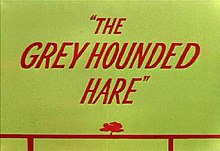The Grey Hounded Hare[1] is a 1949 Looney Tunes short film made by Warner Bros. Pictures and starring the voice talent of Mel Blanc.[2] The film stars Bugs Bunny.[3] It was directed by Robert McKimson, and animated by John Carey, Phil DeLara, Manny Gould and Charles McKimson, with music scored by Carl Stalling.[4] The title refers to the greyhounds of the plot as well as "hounded" meaning pestered or pursued relentlessly.
| The Grey Hounded Hare | |
|---|---|
 Title card for The Grey Hounded Hare | |
| Directed by | Robert McKimson |
| Story by | Warren Foster |
| Starring | Mel Blanc |
| Music by | Carl W. Stalling |
| Animation by |
|
| Layouts by | Cornett Wood |
| Backgrounds by | Richard H. Thomas |
| Color process | Technicolor |
Production company | |
| Distributed by | |
Release date |
|
Running time | 6:40 |
| Language | English |
Plot
editEmerging from a hole at a greyhound track, Bugs Bunny gets caught up in the anticipation of an upcoming dog race. Fascinated by the competitors, Bugs befriends a large greyhound named Gnawbone, unintentionally angering him. When the race begins, Bugs intervenes to "rescue" a mechanical rabbit lure, causing chaos.
Escaping from the pursuing dogs, Bugs heads to the Dog Pound but faces off against Gnawbone. Using clever tricks, Bugs outsmarts the relentless hound, leading him into a collision with a fire hydrant. With Gnawbone defeated, Bugs tries to kiss the lure, only to be electrocuted as it returns to its starting box each time.
Home media
editThis cartoon is available, uncensored and uncut, on Disc 1 of the Looney Tunes Golden Collection: Volume 4 DVD set.
References
edit- ^ Samerdyke, Michael (August 28, 2014). Cartoon Carnival: A Critical Guide to the Best Cartoons from Warner Brothers, MGM, Walter Lantz and DePatie-Freleng. Lulu Press. ASIN B0C2SG41C5. ISBN 979-8393141882.
- ^ Persons, Alisa; Lawson, Tim (December 9, 2004). The Magic Behind the Voices: A Who's Who of Cartoon Voice Actors. University Press of Mississippi. p. 61. ISBN 978-1578066964.
- ^ Lenburg, Jeff (1999). The Encyclopedia of Animated Cartoons. Checkmark Books. pp. 60–61. ISBN 0-8160-3831-7. Retrieved 6 June 2020.
- ^ Beck, Jerry; Friedwald, Will (1989). Looney Tunes and Merrie Melodies: A Complete Illustrated Guide to the Warner Bros. Cartoons. Henry Holt and Co. p. 201. ISBN 0-8050-0894-2.